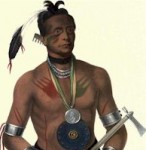
Little Elk
A Winnebago Chief
Hoowanneka, the Little Elk, was a chief of the Winnebago nation, who served with some reputation on the side of the British, in the last war between Great Britain and the United States. At the termination of hostilities, when it was found that the British had made peace for themselves, leaving their Indian allies, residing within the United States, at the mercy of the latter government, the Winnebago reluctantly sought protection under the American flag. Hoowanneka was among the first who became convinced that his nation had been seduced by specious promises into an unnatural war against those whose enmity must be fatal to their existence, and under whose friendship alone they could continue to have a resting-place or a name. United with those who held similar opinions, he exerted a salutary influence over his fierce associates, in restraining them from further outrage upon the American frontiers; and he remained afterwards a friend of our people and government.
The Little Elk was descended from the Caramanie family, the most distinguished band of his nation. He was a tall, fine-looking man, and had some reputation as a speaker, but has left no specimen of his eloquence upon record. In the portrait which accompanies this sketch, he appeared in the costume in which he presented himself before the President of the United States, at Washington, in 1824, when he visited the seat of government as a delegate from his nation. It must have been a singular scene, which exhibited the savage orator, painted in fantastic style, and clad in these wild and picturesque habiliments, addressing the grave and dignified head of the American people, in one of the saloons of the White House. The President and his cabinet, with the diplomatists and other visitors who are usually invited when a spectacle of this kind is presented, must have afforded a striking contrast to the war chiefs and orators of a savage horde decked out in all the barbarian magnificence of beads, paint, and feathers, with their war-clubs, pipes, and banners.
